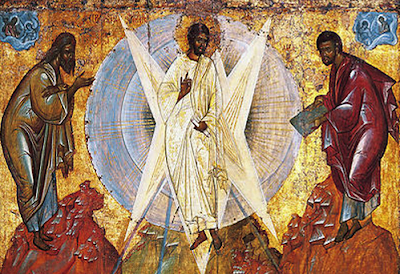The gospel for the Second Sunday of Lent is always the Transfiguration; it parallels the First Sunday What immediately precedes the Temptations of Jesus is his baptism in the Jordan. As Jesus comes up out of the waters he hears the voice of his Abba, ‘You are my beloved Son’. Michael Casey in his book, Fully Human Fully Divine, translates this phrase with a slight change: ‘You are my Son, you are loved by me, in you I find my delight’ (Mark 1:11). Here in changing ‘beloved’ to ‘you are loved by me’ we sense more powerfully that God has poured the fullness of his Love into his Son. Jesus faces the temptations in and through the experience of knowing the depth and breadth of love from his Father. Today’s gospel of the Transfiguration of Jesus repeats once again the total Love of the Father towards his Son. As Jesus is transfigured once again a voice is heard. And what does it say? Using Michael Casey’s translation: ‘This is my Son whom I love. Listen to him’ (Mark 9:8). Unconditional love bestowed on Jesus at his baptism and re-affirmed at his Transfiguration as his ministry is taking a final turn, leading him to his death and Resurrection.of Lent, which always has the gospel of the Temptations.
Unconditional Love: this is the face we behold at the Transfiguration, this is the One whom we are to become more and more like…this is the One in whom we move, and live and have our being. Michael Casey writes: “By being instructed to listen to Jesus, the disciples are being informed that he is God’s voice on earth because this man is, in reality, the Son of God’s love” (p.195). The Son of God’s love, the face of Christ is the face of unconditional Love, the Love that Jesus has received from the Father. And we see through Jesus’ life how this unconditional Love is incarnated in both word and deed. The Jesuit scripture scholar Fr. John Donahue comments the following on this gospel: “Such a mystery of total self-giving is rooted in the very nature of God, ‘who did not spare his own Son but handed him over for us’” (Hearing the Word of God, p.44). These words I believe give us some idea of what unconditional Love is: total self-giving…The incarnate face of God’s unconditional Love is Christ. Jesus gave his Self totally for us…at the root of unconditional Love is the gift of Self.
With the memorial Mass that we had for Val McKee I was very moved by the different ways the family saw their mother…grandmother. She lived…she reflected ‘unconditional love’. Obviously it was not 100% of the time, but this was what she was growing into; she lived it enough, embodied it enough that this was one of the main memories left in the heart and consciousness of the family.
What precedes the gospel of the Transfiguration in all three synoptic accounts is the first prediction of the passion of Jesus. Then, right after Jesus’ prediction of his passion he says: if you are to be my disciples you must take up your cross and follow me, for whoever wants to save their life will lose it and whoever surrenders their life will find it. There is no following of Jesus, there is no Transfiguration without the cross. There are no attachments with unconditional Love…it is unrequited…expecting nothing in return….surrender, letting go free us to love without condition. We live it when we take up our own cross, when we die to our selfish self for greater life and love. What transforms evil, what transforms those dark, negative pulls into what is not life? It is only the power of Love…love transforms, love absorbs the darkness and transfigures it into life. We see this lived fully and completely in Jesus and as his followers this is the work of discipleship that we are called to continue.
What passages in the gospels show us show us Jesus embodying ‘unconditional love’? What in the writings of St. Paul do we find him speaking of this Love that is stronger than death? To name a few from the Gospels: how many times must I forgive? Jesus says, ‘70 times 7’, that is infinitely. With the woman caught in adultery from John’s gospel: Jesus says ‘Whoever has not sinned throw the first stone?’ One by one the accusers leave and Jesus goes a step further with the woman: ‘Woman, I don’t condemn you…go and do not sin again’. And this saying: ‘If you are struck on one cheek offer the other as well’. Don’t return hurt for hurt. And, ‘Love your enemies’. Loving those who love you is easy…but love your enemies.
If we turn to St. Paul: the Philippians hymn about Jesus is a hymn of unconditional Love; ‘his state was divine, yet he did not cling to his equality with God…but emptied himself….’ In Romans St. Paul tells us that nothing can ever come between us and the love of God made visible in Christ…this is the power of Love.
The message of today’s gospel is to be transformed in love, that is the love that has no conditions and expects nothing back for its self-offering. This is the love that is ready to stretch itself in the shape of a cross. This is the love that Jesus meets us with daily. To paraphrase Pope Francis from a talk several years ago: ‘stop and contemplate the face of Jesus’…do this in order to transformed in love and to put into practice this love with which we are loved. With Jesus we can love unconditionally.


